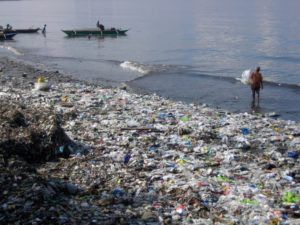More Plastic Than Fish in the Sea? A Big Problem for Pack2Go

By 2050, there will be more plastic than fish in the world’s oceans. To try to stop this, France has banned disposable plastic plates, cups, and utensils, putting the business of manufacturing companies represented by Pack2Go in danger.
Did you know that scientists are estimating that by 2050, there will be more plastic than fish in the worlds’ oceans? According to a report created by the World Economic Forum, worldwide plastic use has increased 20 times in the past 50 years and is expected to double in the next 20 years. Making this plastic comes at a cost and plays a major role in climate change, as plastic production represents 6% of global oil consumption and 1 percent of the global carbon budget (and these numbers are expected to increase in the next 30 years!). Furthermore, we do a terrible job of reusing and disposing of this plastic. The report states that more than 70 percent of plastic produced is either put in a landfill or improperly enters the world’s waterways and infrastructure through littering.1
France decided to take a stance against the “plastic problem” by passing the Energy Transition for Green Growth Act, which banned disposable plastic bags in July 2016. Surprisingly, the country took the law a step further by banning the use and production plastic plates, cups, and utensils by 2020.2 Once in effect, the law will only allow disposable goods that are compostable at home and are made from 50% biologically-sourced materials.
Pack2Go Europe, a Brussels-based company that represents the continent’s packaging manufacturers, is challenging this new regulation by urging the European Commission to take legal action against France. They believe that the ban violates the EU law on the movement of goods. This ban forces their producers to innovate completely new products and would effectively kill their business as is. Pack2Go believes that a technology for tableware that can be composted domestically and meets the critical food hygiene standards does not currently exist.3
https://www.youtube.com/watch?v=9fuGesFHRa8
While I think France’s effort to combat climate change is exemplary, I’m not sure that the best way to do so is by starting with the to-go forks, knives, and containers at fast food chains. Pack2Go’s website focuses on the benefits of plastic packaging and one-time use cups and cutlery as necessary for food hygiene and safety.4 This can be seen by their promotional video linked above. Rather than focus on plastic production, they petition European governments to refocus their attention on litter prevention in order to increase recycling and help people contribute to a circular economy. I agree with their recommendations as single-use containers and disposable items are becoming increasingly important as our lifestyles change to be more on-the-go. If plastic can no longer be used to create these items, how can we be so sure that their replacements will actually be less harmful for climate change and the environment? Additionally, low-income families rely on plastic utensils and plates, and their replacement with a more expensive eco-friendly item will greatly hurt this population.2
The move away from plastic can be seen world-wide as many cities in the US and countries across the world have banned plastic bags and increased incentives for customers to look for alternative products. In light of these regulations, innovative companies have begun to develop out of the box alternatives to plastic products. Bakey’s in India, for example, has created edible bio-degradable cutlery made from millet, rice, and wheat flours, that has a shelf life of three years.5 A number of US-based companies, such as World Centric and Fabri-kal, are developing plant-based, compostable cutlery and packaging solutions to contribute to a greener economy; however, these items do not comply with France’s new law that states the items must be compostable at home.6
While the world has had some success innovating in the plastic-alternative tableware space, production is not advanced enough to meet the demands of France’s new ban. Rather than ban these plastic products, the country should incentivize companies like Pack2Go to develop new eco-friendly products that meet these stringent requirements. France has gone too far by banning plastic cutlery which makes me wonder, what’s next? Will all plastic bottles be banned? If so, how will bottling companies with major bargaining power, like Coca Cola, be able to sustain their business? Pack2Go is facing an enormous problem right now and needs to start developing more sustainable products before their business is replaced by others.
Word Count: 697
- Sarah Kaplan, “By 2050, there will be more plastic than fish in the world’s oceans, study says,” The Washington Post, January 20, 2016, https://www.washingtonpost.com/news/morning-mix/wp/2016/01/20/by-2050-there-will-be-more-plastic-than-fish-in-the-worlds-oceans-study-says/, accessed November 2016.
- James McAuley, “France becomes the first country to ban plastic plates and cutlery,” The Washington Post, September 19 2016, https://www.washingtonpost.com/news/worldviews/wp/2016/09/19/france-bans-plastic-plates-and-cutlery/, accessed November 2016.
- Chase Purdy, “France bans plastic cups, plates, and cutlery in a bid to save the planet,” Quartz, September 23, 2016, http://qz.com/788845/france-bans-plastic-cups-plates-and-cutlery-in-a-bid-to-save-the-planet/, accessed November 2016.
- Pack2Go Europe, http://www.pack2go-europe.com/en/, accessed November 2016.
- Mica Kelmachter, “India’s Edible Cutlery Points The Way For A Zero- Waste Future,” Forbes, March 30, 2016, http://www.forbes.com/sites/micakelmachter/2016/03/30/indias-edible-cutlery-paves-the-way-for-asia-to-dream-of-zero-waste/#71a4f2a651f8, accessed November 2016.
- David Morris, “France bans all plastic dishware starting in 2020,” September 17, 2016, http://fortune.com/2016/09/17/france-bans-plastic-dishware-2020/, accessed November 2016.






Kat, thank you for this post on an increasingly important issue. I think regulation obviously be a very important tool in terms of incentivizing or forcing positive action. In this case, it seems to me that the intent of France’s regulation is to aggressively force companies to innovate for better environmental outcomes. As you noted, compostable cutlery does exist, but it does not meet the exact standards of being able to compost in-home. This should indicate that it is not a major technological leap from current technology to France’s future standards. In addition, by giving several years of runway in their 2020 implementation timeline I think that it makes it a more reachable goal. In terms of the cost of the new cutlery, I think that continued innovation will bring the cost down in time. Initially, businesses may bear the larger proportion of increased cost, but I do agree that it could initally hurt low-income families. Overall, I think France made the right decision to be a leader to force better environmental outcomes, and if this legislation has to be revisited closer to final implementation because the technology is truly not achievable then that would be fine. Hopefully it will influence the entire EU to adopt similar regulation, rather than the EU stifling these goals.
Thank you very much for sharing your insights on this very important topic! I actually believe that your argument is missing one important aspect: the negative externalities of plastic. This means that plastic is actually too cheap. While this allows lower income families to purchase more plastic, it means that society as a whole carries the cost difference between this lower price plastic and bio-degradable plastic. I would actually argue that banning plastic or taxing it should be a government priority to maximize welfare overall.
Interesting article Kat. While I indeed see merit in questioning the harshness and effectiveness of France’s plastic policy, I feel that the value placed on some of your premises do not nearly outweigh the high cost to society from plastic waste. For example, the argument that low-income families rely on plastic utensils and plates seems hard to justify as a reason for not banning plastic materials. The cost of an IKEA metal knive for instance is about $0.50 a piece [1], whereas a plastic knife is at about $0.24 [2]. The lifetime of a metal knife is infinitely much longer than a plastic knife, not justifying the cost differential between the two – so arguably it is both in the interest of society as well as low-income families to push the latter towards non-plastic material consumption.
In addition, you say you are not sure about whether replacements will be more environmentally friendly than plastic items. However, plastic items are estimated to take about 400-1000 years to be decomposed and in the meantime present a real problem to both land and water animals [3], so it seems like any attempt to improve this detrimental effect is worthwhile. Especially, as stimulated by the French government, for it to be compostable at home instead for it to take 400-1000 years to degrade.
In short, any stimulants to get reduce plastic waste are favorable to society as a whole – and I think companies such as Coca Cola will be just fine sustaining their business with packaging that might cost a couple of more cents to produce. If it takes a government to impose strict rules for those companies to get to work and innovate, then so be it.
[1] IKEA website, http://www.ikea.com/au/en/catalog/categories/departments/eating/18865/ [Accessed 11/7/2016]
[2] Partycity website, http://www.partycity.com/category/entertaining+serving/cutlery.do [Accessed 11/7/2016]
[3] Daily Mail, 2008. Available from: http://www.dailymail.co.uk/news/article-519870/Banish-Bags-Used-minutes-1-000-years–The-life-cycle-plastic-bags.html [Accessed: 11/7/2016]
Interesting article Kat! This post really shows the importance of not taking the “obvious” measures without looking at the bigger picture or looking at the entire life cycle of a product.